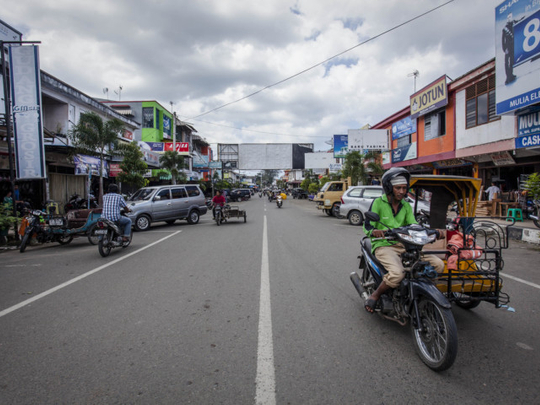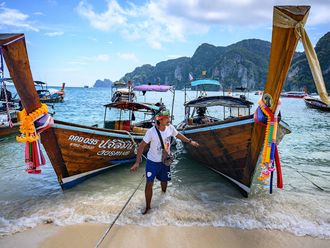
BANDA ACEH, Indonesia
Things were hopping at Redinesh Coffee Roastery in this seaside city one recent evening. Electronic dance music blared from the cafe’s speakers as patrons, some in ripped jeans and fashionable spectacles, sat outside drinking locally sourced coffee and smoking cigarettes. But then the Muslim call to prayer sounded, and a waitress hurriedly ushered everyone back into the cafe. She turned down the music, closed the doors and covered the windows. It was the Maghrib — the second to last of the five daily calls to prayer — and outdoor socialising had to cease.
Aceh province, on the northern tip of Sumatra island, stands alone in having formally established Sharia in Indonesia, a Muslim-majority country with a relatively secular constitution. In Aceh, women are required to dress modestly, liquor is prohibited, and numerous offences — from adultery to homosexuality to selling liquor — are punishable by public whipping. Aceh began its experiment with Sharia in 2001, after receiving special authorisation from Indonesia’s central government, which was intent on calming separatist sentiment in the deeply conservative region. Now, Sharia police officers roam the province, raiding everything from hotel rooms to beaches in a hunt for immoral activity.
In the decade and a half since, Indonesia as a whole has drifted in a conservative direction, and Aceh, once an outlier, has become a model for other regions of the country seeking to impose their own Sharia-based ordinances, alarming those who worry about the nation’s drift from secularism.
“Whenever Aceh issues a law, saying it’s the highest order of Sharia, it provokes others to do the same thing,” said Andy Yentriani, a former commissioner on Indonesia’s National Commission on Violence Against Women, who wants the national government to repeal certain Sharia-based regulations as violations of the Indonesian Constitution.
A recent study found that more than 442 Sharia-based ordinances have been passed throughout the nation since 1999, when Jakarta gave provinces and districts substantial powers to make their own laws. These include regulations concerning female attire, the mixing of the sexes and alcohol.
But for local officials, the spread of Sharia from Aceh is a point of pride, and delegations from areas with a history of embracing conservative Islam regularly visit to see how it has been carried out.
Moderate
“They look at how we facilitate an atmosphere of religiosity,” said Syahrizal Abbas, head of Aceh’s Department of Sharia, who said he gives visiting delegations advice on how to incorporate Sharia teachings into law. Syahrizal, who is considered a moderate, said that Aceh’s version of Sharia was moderate, because it welcomed alternative schools of Islamic thought and accepted the role of female leaders.
Indeed, Banda Aceh, the province’s capital, is led by Illiza Sa’aduddin Djamal, the city’s first female mayor. Many activists for women’s rights say they supported her candidacy in hopes that she would be a progressive leader. Instead she has proved to be a zealous, hands-on enforcer of Aceh’s conservative moral code, issuing a night-time curfew for women and personally dispersing events deemed to contradict Sharia.
Last February, Illiza, wearing a black headscarf, strode into the hall where Indonesian Model Hunt, a beauty competition, was underway, interrogating cowering models about the event as news cameras rolled.
“Why aren’t you wearing a jilbab?” she asked one, referring to what Indonesians call a headscarf. Sharia police loaded the competition’s trophies into a bag and escorted models out of the building.
“Sharia right now is about what someone’s wearing,” said Ratna Sari, head of the Aceh branch of Solidaritas Perempuan, a women’s rights organisation, who said she longed for a version of Sharia that tackled political corruption and promoted good public services. “Where are all the Islamic hospitals?”
The imposition of Sharia came after Aceh’s decades-long struggle for independence with the central government ended in 2005. Scars remain from the war, as well as the after-effect of the Indian Ocean tsunami that killed 230,000 people here in 2004. Today Aceh is one of Indonesia’s poorest provinces, with nearly 1 in 5 people believed to be living in poverty.
In February, the Acehnese will go to the polls to select new leaders, but none of the candidates for mayor or governor are willing to challenge the primacy of Sharia.
‘Model for nation’
Irwan Johan, a vice speaker for the Acehnese Provincial Legislature, said any real debate over Sharia was impossible, even though “a silent majority” thinks the government has gone too far.
“They’re not brave enough to say anything,” he said about critics of Sharia. “Talk about issues of religion and you could be expelled, or be considered a person who isn’t really Acehnese. Everybody became a hypocrite.”
Islamist leaders from outside the province are hoping to push things further. In late December, Rizieq Shihab, a firebrand preacher who leads the hard-line Islamic Defenders Front, a national organisation that led the campaign to have Jakarta’s Christian governor prosecuted on blasphemy charges, gave a fiery speech before a crowd in Banda Aceh.
“When Islam first came to Indonesia it entered through Aceh, correct?” he asked the crowd. “Correct!” the crowd thundered back.
“Aceh is a model for the entire Indonesian nation,” the preacher continued. “It must become the locomotive for the movement to apply Sharia throughout Indonesia. Agreed?” he asked the crowd.
“Agreed!” the crowd shouted back.
— New York Times News Service












